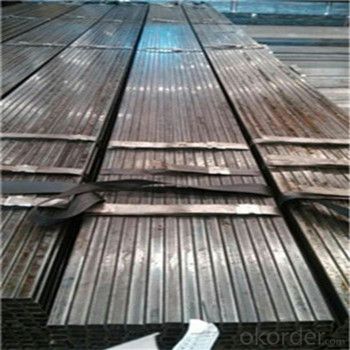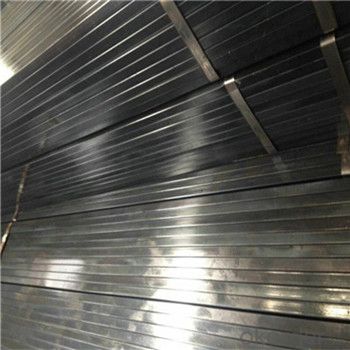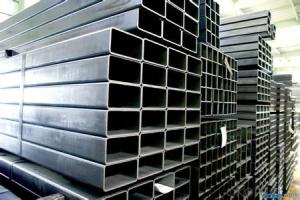Construction Material Q235 Black Welded Tubular Steel
- Loading Port:
- China Main Port
- Payment Terms:
- TT or LC
- Min Order Qty:
- -
- Supply Capability:
- -
OKorder Service Pledge
OKorder Financial Service
You Might Also Like
1、Construction Material Q235 Black Welded Tubular Steel:
ERW steel pipe is electric resistance welding, the abbreviation for ERW for transporting oil and natural gas vapor liquid objects, can meet the requirements of high and low pressure, the transport in the world with pipe sector accounted for a pivotal position.
2、Main Features of Construction Material Q235 Black Welded Tubular Steel:
• High manufacturing accuracy
• High strength
• Good visual effect
• Reasonable price
• Small inertia resistance
• Strong heat dissipation ability
3、Construction Material Q235 Black Welded Tubular Steel Specification:
Standard | GB, DIN, ASTM ASTM A106-2006, ASTM A53-2007 |
Grade | 10#-45#, 16Mn 10#, 20#, 45#, 16Mn |
Thickness | 1 - 33 mm |
Section Shape | Round |
Outer Diameter | 21 - 610mm |
Place of Origin | Tianjin, China (Mainland) |
Secondary Or Not | Non-secondary |
Application | Hydraulic Pipe |
Technique | Cold Drawn |
Certification | API |
Surface Treatment | factory state or painted black |
Special Pipe | API Pipe |
Alloy Or Not | Non-alloy |
Length | 5-12M |
Outer Diameter | 21.3-610mm |
Grade | 20#, 45#, Q345, API J55, API K55, API L80, API N80, API P110, A53B |
Standard | ASME, ASTM |
1) Material:20#(ASTM A 106/A53 GRB.API5LGRB,GB),45#,16Mn,10#.
2) Specification range:OD:21.3-610mm,WT:6-70mm,length:6-12m or according to the requirement of clients.
3) Excutive standards:GB,ASME API5L.ASTM A 106/A53,Despite of the above standards,we can also supply seamless steel pipe with standard of DIN,JIS,and so on,and also develop new products according to the requirements of our clients!
4) Surface:black lacquered,varnish coating or galvanized.
5) Ends:Beveled or square cut,plastic capped,painted.
6) Packing:bundles wrapped with strong steel strip,seaworthy packing.
4、Packaging & Delivery
Packaging Details: | seaworthy package,bundles wrapped with strong steel strip |
Delivery Detail: | 15-30days after received 30%TT |
5、FAQ of Construction Material Q235 Black Welded Tubular Steel:
①How is the quality of your products?
Our products are manufactured strictly according to national and internaional standard, and we take a test
on every pipe before delivered out. If you want see our quality certifications and all kinds of testing report, please just ask us for it.
Guaranteed: If products’ quality don’t accord to discription as we give or the promise before you place order, we promise 100% refund.
②How about price?
Yes, we are factory and be able to give you lowest price below market one, and we have a policy that “ for saving time and absolutely honest business attitude, we quote as lowest as possible for any customer, and discount can be given according to quantity”,if you like bargain and factory price is not low enough as you think, just don’t waste your time.Please trust the quotation we would give you, it is professional one.
③Why should you chose us?
Chose happens because of quality, then price, We can give you both.Additionally, we can also offer professional products inquiry, products knowledge train(for agents), smooth goods delivery, exellent customer solution proposals.Our service formula: good quality+good price+good service=customer’s trust
SGS test is available, customer inspection before shipping is welcome, third party inspection is no problem.
6、 Welded Black ERW Steel Pipe Images:


- Q:How do you calculate the pipe friction loss for steel pipes?
- In order to determine the pipe friction loss for steel pipes, one must utilize the Darcy-Weisbach equation. This particular equation is widely employed in the field of fluid dynamics to ascertain the drop in pressure or friction loss that arises from the flow of fluid through a pipe. The equation is formulated as follows: The pressure drop or friction loss (ΔP) can be calculated by dividing the product of the Darcy friction factor (f), the length of the pipe (L), the density of the fluid (ρ), and the square of the velocity of the fluid (V²), by twice the diameter of the pipe (D). The Darcy friction factor (f), which is a dimensionless value, is contingent upon the Reynolds number (Re) and the relative roughness (ε/D) of the pipe. Here, ε represents the absolute roughness of the pipe. There are various correlations or Moody's diagram that can be employed to determine the friction factor. Once the friction factor has been ascertained, the values for length, density, velocity, and diameter can be substituted into the equation to calculate the pressure drop or friction loss. It is of utmost importance to ensure that the units for all variables remain consistent (e.g., length in meters, density in kg/m³, velocity in m/s, diameter in meters) in order to achieve precise results. By utilizing this equation and acquiring the requisite parameters, it becomes possible to calculate the pipe friction loss for steel pipes. Such calculations are essential in the design and analysis of fluid flow systems.
- Q:Can steel pipes be used for HVAC systems?
- Yes, steel pipes can be used for HVAC systems. Steel pipes are commonly used in HVAC systems for their durability, strength, and resistance to corrosion. They are suitable for transporting hot or cold air, water, or refrigerant throughout the system.
- Q:Are steel pipes suitable for potable water applications?
- Yes, steel pipes are suitable for potable water applications. Steel pipes are commonly used for transporting water in various industries and municipal water systems. They are known for their durability, strength, and resistance to corrosion, making them a reliable choice for potable water systems. Steel pipes also have the advantage of being able to withstand high pressure and temperature conditions, making them suitable for both hot and cold water applications. Additionally, steel pipes can be easily welded, ensuring leak-free connections. However, it is important to note that the quality of the steel used and proper maintenance are crucial factors in ensuring the safety and suitability of steel pipes for potable water applications. Regular inspection and maintenance should be done to prevent corrosion and ensure the integrity of the pipes.
- Q:What materials are used in scaffolding pipes?
- The bamboo scaffold board made of bamboo or bamboo.
- Q:How are steel pipes protected against internal scaling?
- Steel pipes are protected against internal scaling through a process called internal coating or lining. This involves the application of a protective layer on the interior surface of the pipe to prevent the formation of scales or deposits. There are several methods used for this purpose. One common method is the application of epoxy coatings. Epoxy is a durable and corrosion-resistant material that forms a continuous barrier on the inside of the pipe. It helps to prevent the accumulation of minerals and other substances that can lead to scaling. Epoxy coatings are often applied by spraying or brushing onto the pipe's interior surface and then cured to form a hard and smooth finish. Another method used for protecting steel pipes against internal scaling is cement mortar lining. In this process, a layer of cement mortar is applied to the inside of the pipe. The cement mortar acts as a barrier against scaling and also provides additional protection against corrosion. This lining process is commonly used for large-diameter pipes that are used in water distribution systems. Polyethylene (PE) lining is another technique employed to protect steel pipes from internal scaling. PE lining involves the insertion of a high-density polyethylene liner into the pipe. This liner acts as a barrier against scaling and also helps to reduce friction, improving the flow of fluids through the pipe. PE lining is often used in applications where a smooth interior surface is required, such as in oil and gas pipelines. In addition to these methods, regular maintenance and cleaning of the pipes can also help prevent internal scaling. This may involve the use of chemical cleaning agents or mechanical cleaning techniques to remove any deposits that have formed on the pipe's interior surface. Overall, protecting steel pipes against internal scaling is crucial to maintain their efficiency and prolong their lifespan. By utilizing various coating and lining methods, as well as implementing proper maintenance practices, the risk of internal scaling can be significantly reduced.
- Q:How do you calculate the flow rate in a steel pipe?
- To calculate the flow rate in a steel pipe, you need to consider the pipe's diameter, length, and the pressure difference across it. By applying the Bernoulli's equation or using the Darcy-Weisbach equation, you can determine the flow rate based on these variables.
- Q:What are the different types of steel pipe coatings for chemical processing plants?
- There are several types of steel pipe coatings commonly used in chemical processing plants, including epoxy, polyethylene, polyurethane, and fusion-bonded epoxy (FBE) coatings. Each coating offers different benefits such as corrosion resistance, chemical resistance, and enhanced durability, which are crucial for protecting steel pipes against the harsh conditions and corrosive substances found in chemical processing plants.
- Q:How are steel pipes used in the construction of wind farms?
- Steel pipes are commonly used in the construction of wind farms to support and secure the wind turbines. These pipes serve as the foundation for the turbines, providing stability and structural integrity. They are used to create the tower structure, which supports the nacelle and rotor blades. Additionally, steel pipes are used for transporting and distributing the electrical cables within the wind farm, ensuring efficient transmission of electricity generated by the turbines.
- Q:How are steel pipes transported?
- Steel pipes are typically transported using various methods, including trucks, trains, and ships. They are often loaded onto flatbed trucks or railcars for land transportation, while larger quantities are transported by bulk carriers or container ships for overseas shipping. The pipes are secured with straps or chains to ensure safe and stable transport, and they may also be packed in bundles or placed in specially designed containers to protect them from damage during transit.
- Q:How are steel pipes cleaned and maintained?
- Steel pipes are cleaned and maintained through a combination of mechanical and chemical methods. Mechanical cleaning involves removing any loose debris or scale using tools like wire brushes or high-pressure water jets. Chemical cleaning may be used to dissolve any stubborn deposits or corrosion using suitable solvents or acids. Regular inspection and maintenance are essential to identify and address any potential issues such as leaks, rust, or structural damage. Coatings, such as paint or anti-corrosion materials, are often applied to protect steel pipes from environmental factors and extend their lifespan.
1. Manufacturer Overview |
|
|---|---|
| Location | |
| Year Established | |
| Annual Output Value | |
| Main Markets | |
| Company Certifications | |
2. Manufacturer Certificates |
|
|---|---|
| a) Certification Name | |
| Range | |
| Reference | |
| Validity Period | |
3. Manufacturer Capability |
|
|---|---|
| a)Trade Capacity | |
| Nearest Port | |
| Export Percentage | |
| No.of Employees in Trade Department | |
| Language Spoken: | |
| b)Factory Information | |
| Factory Size: | |
| No. of Production Lines | |
| Contract Manufacturing | |
| Product Price Range | |
Send your message to us
Construction Material Q235 Black Welded Tubular Steel
- Loading Port:
- China Main Port
- Payment Terms:
- TT or LC
- Min Order Qty:
- -
- Supply Capability:
- -
OKorder Service Pledge
OKorder Financial Service
Similar products
New products
Hot products
Related keywords






























